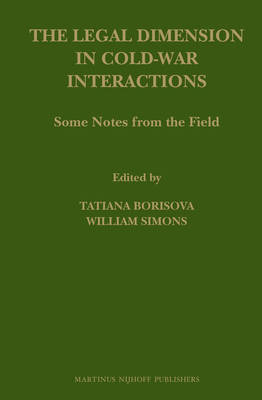
- Afhalen na 1 uur in een winkel met voorraad
- Gratis thuislevering in België vanaf € 30
- Ruim aanbod met 7 miljoen producten
- Afhalen na 1 uur in een winkel met voorraad
- Gratis thuislevering in België vanaf € 30
- Ruim aanbod met 7 miljoen producten
Zoeken
The Legal Dimension in Cold War Interactions
Some Notes from the Field
€ 273,45
+ 546 punten
Omschrijving
Given their relationship to political rhetoric, myths of the Cold War certainly matter today; the legal field is no exception. Although Cold-War studies remains a blooming field, its legal dimensions have not been sufficiently developed. Only recently have legal scholars begun to embark upon research in law and the Cold War and how this area is regarded nowadays, both explicitly and implicitly. Preliminary results show that, on both sides of the Iron Curtain, knowledge of law of the 'Other' was encapsulated within two main frameworks: ideological and pragmatic. How did these approaches interrelate and influence one another? Can pure knowledge strictly be divided from contextual conditions? The chapters in this volume present retrospective accounts of actors who have been involved in the circulation of knowledge through the Curtain and, also, research on recent political and legal phenomena echoing the Cold-War discourse.
Contributors: Jane Henderson, Albert J. Schmidt, Zlata E. Benevolenskaya, Leena Lehtinen, Boris N. Mamlyuk, William Partlett, Paul B. Stephan
Contributors: Jane Henderson, Albert J. Schmidt, Zlata E. Benevolenskaya, Leena Lehtinen, Boris N. Mamlyuk, William Partlett, Paul B. Stephan
Specificaties
Betrokkenen
- Uitgeverij:
Inhoud
- Aantal bladzijden:
- 210
- Taal:
- Engels
- Reeks:
- Reeksnummer:
- nr. 62
Eigenschappen
- Productcode (EAN):
- 9789004203327
- Verschijningsdatum:
- 21/11/2012
- Uitvoering:
- Hardcover
- Formaat:
- Genaaid
- Afmetingen:
- 160 mm x 241 mm
- Gewicht:
- 476 g

Alleen bij Standaard Boekhandel
+ 546 punten op je klantenkaart van Standaard Boekhandel
Beoordelingen
We publiceren alleen reviews die voldoen aan de voorwaarden voor reviews. Bekijk onze voorwaarden voor reviews.







